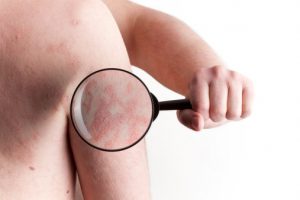 Psoriasis and general bone loss have been found to be linked and studies suggest it may help osteoporosis treatment research. Researchers from the Genes, Development and Disease Group found that psoriasis patients experience higher levels of bone loss as a result of the disease. Their findings, published in Science Translational Medicine, described the molecular communication that is established between the inflamed skin and loss of bone mass. The research unveiled a possible treatment for psoriasis with already available drugs that could benefit bone health, too.
Psoriasis and general bone loss have been found to be linked and studies suggest it may help osteoporosis treatment research. Researchers from the Genes, Development and Disease Group found that psoriasis patients experience higher levels of bone loss as a result of the disease. Their findings, published in Science Translational Medicine, described the molecular communication that is established between the inflamed skin and loss of bone mass. The research unveiled a possible treatment for psoriasis with already available drugs that could benefit bone health, too.
Psoriasis is an autoimmune disorder that affects two percent of the world’s population. Manifested as inflammation and scaling of the skin, psoriasis increases a person’s risk of developing a type of metabolic syndrome by predisposing them to obesity, cardiovascular disease, and diabetes.
Advertisement
First author and researcher Özge Uluçkan said, “We have detected that psoriasis causes the widespread and progressive loss of bone tissue. There is no active destruction of the bone. On the contrary, during the bone regeneration cycle, bone is not formed at the necessary speed to replace what is being lost and, therefore, patients’ bone mass reduces over time.”
Previous research found that in animal models the skin generated large amounts of the cytokine IL-17, which activates cellular inflammation response to damage. IL-17 travels through the blood and ends up in the bones where it blocks osteoblasts (cells responsible for bone formation) – just like it occurs in osteoporosis, arthritis, and myeloma. The mice were treated with IL-17 blockers, and normal function was restored along with bone formation.
When specialized CT scans were administered in psoriasis patients and healthy individuals, the researchers found that psoriasis patients had greater bone loss, which was correlated with higher levels of cytokine IL-17A in blood.
Uluçkan explained, “Treating psoriasis patients with IL-17 blockers — some already on the market — could have a beneficial effect on the loss of bone tissue, unlike other compounds that might only affect skin inflammation.”
“IL-17 has become a focus point for the investigation of the immune system. Its deregulation is not only related to psoriasis, but also to other diseases, such as rheumatoid arthritis, inflammatory bowel disease, and multiple sclerosis. Some of these have been linked to loss of bone tissue, as in the case of inflammatory bowel disease, found in 70% of cases. It would be interesting to study whether IL-17 is responsible for this secondary effect,” Uluçkan concluded.
Treat psoriasis with home remedies
Although medications prescribed by your doctor can help you greatly with your psoriasis, home remedies can offer symptom relief and aid with your condition, too. Here are some home remedies you can utilize alongside your medications in order to best control and manage your psoriasis.
Keep skin moist – moisturize whenever you can and ensure your skin doesn’t dry out. It’s important to note that during hotter temperatures you should stick to a thinner layer of lotion, as thick layers mixed with sweat can cause irritation.
Bathe responsibly – don’t bathe or shower too often or too seldom. Also, don’t use very hot water as that causes the skin to dry out. Add salt, oil, or finely ground oatmeal to your baths for extra moisture, and minimize your bathing to every three days instead of daily.
Make prescription lotions and ointments part of your daily routine and be consistent with your treatment plan.
Get some sunlight – but no more than 20 minutes three times a week. Make sure you wear at least SPF 30. Avoid sunburns as well as that can worsen your condition.
Don’t smoke – smokers have higher cases of psoriasis compared to those who don’t smoke. The effects were also seen greater in women.
Reduce your alcohol intake – or eliminate it altogether. Men are affected by alcohol more than women, but both sexes should limit their intake if they have psoriasis.
Change your diet – although there isn’t solid evidence to support an effective diet for psoriasis, some patients have found that removing gluten, dairy, sugar, and caffeine improves their sores.
Manage your mental health – see a therapist if your self-esteem or mental state has taken a hit from your condition. Joining a support group can be beneficial in your treatment as well.
By following these helpful home remedies along with your prescribed treatment plan, you can better help control and manage your psoriasis.
Related Reading:
Psoriasis raises type 2 diabetes risk, severity influenced by intensity of the skin disorder
Psoriasis raises the risk of type 2 diabetes depending on the intensity of the skin disorder. Psoriasis has been found to be an independent risk factor for type 2 diabetes, with a much greater risk found in those with severe psoriasis. The researchers estimate 115,000 individuals will develop type 2 diabetes based on their risk of psoriasis alone. Continue reading…
Advertisement
Psoriasis patients have fewer opportunities for biologics treatment
Psoriasis patients have fewer opportunities for biologics treatment as they age. The findings suggest that age is a large factor when it comes to treatment options for psoriasis – a skin condition. The researchers found that an age increase of 30 years reduced access to treatment through biologics by 65 percent. Continue reading…
Sources:
http://www.eurekalert.org/pub_releases/2016-03/cndi-csd031616.php
http://www.webmd.com/skin-problems-and-treatments/psoriasis/overview
http://www.webmd.com/skin-problems-and-treatments/psoriasis/overview?page=2
